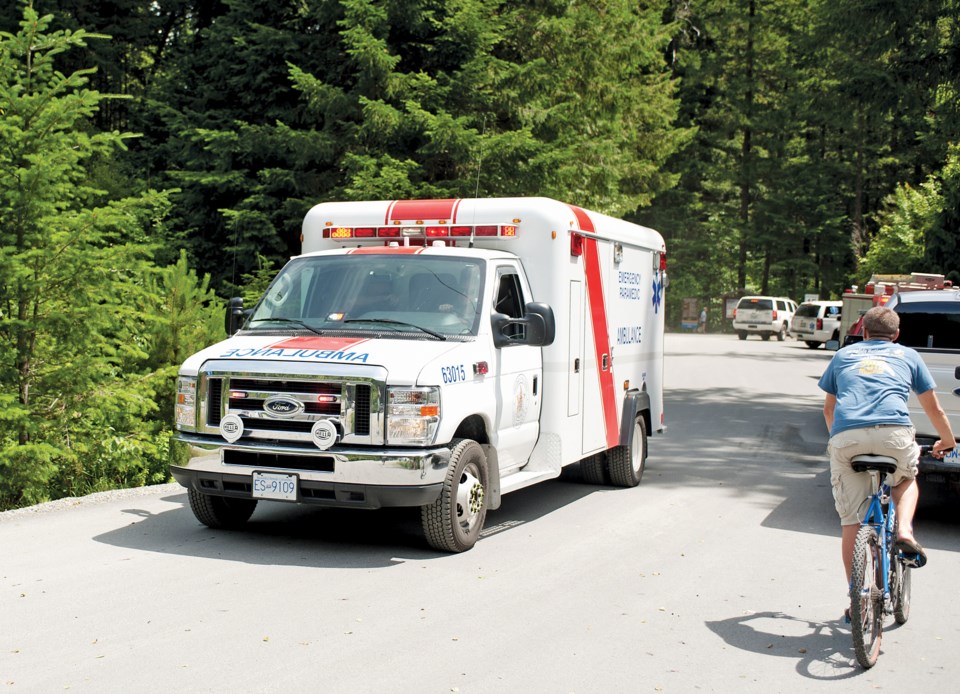A group of local physicians and community members are calling for a reimagining of health-care in the Sea to Sky corridor—a new regional hospital co-located within a master-planned wellness village, which they say would be the first of its kind in Canada.
The proposal, presented to the Sea to Sky Regional Hospital District (SSRHD) board on June 25, argues the aging Squamish General Hospital is no longer capable of meeting the demands of the fast-growing corridor and that simply upgrading the existing facility is no longer feasible.
“Our growing region must have a new regional hospital planned by local physicians,” Grant McRadu, a former municipal administrator and one of the advocates behind the proposal, told the board. “Anything short of that commitment is just tinkering with the lives of those who presently live and will move to the Sea to Sky region.”
The group of advocates for a new facility, which includes Dr. Steven Masselink and Dr. Richard Cudmore—the current and former medical directors of Squamish General Hospital, respectively—are looking to a site within the District of Squamish that could accommodate both a modern regional hospital and a surrounding wellness village. They say that additional space around the hospital could house complementary medical, biomedical, and long-term care facilities, as well as seniors' housing and workforce accommodations.
McRadu said the idea is inspired by similar "wellness villages" in Europe and the United States, which bundle hospitals with research, treatment and wellness hubs in walkable, purpose-built communities.
“Hospitals are expensive, but our vision proposes a way forward for a hospital to become a large economic magnet,” he told the board. “Hospitals attract other symbiotic medical and biomedical facilities.”
McRadu’s group believes their vision would be the first fully master-planned health and wellness campus in the country, designed from the ground up to integrate medical services with long-term residential, recreational and employment opportunities.
Planning for future care
Vancouver Coastal Health (VCH) is currently midway through its Health Vision Sea to Sky master planning process, which is evaluating long-term health-care needs across the region. McRadu said while VCH’s CFO and the former chair of the board have both expressed support for the concept of clustering health facilities around hospitals, he’s frustrated that local physicians have been largely excluded from the planning process.
“VCH is once again in another round of community engagements that are neglecting input from local Sea to Sky medical professionals,” he said. “We now need our communities to understand the enormous health challenges our current hospital is facing and most importantly, we are now looking to you, the SLRD hospital board to become the local champion that will lead VCH to approve the funding of a new regional district hospital.”
VCH did not respond to a request for comment before Pique’s publication deadline.
Cudmore, who has practiced in Squamish since 1978, described the current hospital as desperately outdated.
“There’s not enough beds, there is a very small [emergency] department. We have almost no diagnostics, no CT, no MRI, and we’ve got very little space for our [operating rooms]. We have no facilities for pediatrics. Our psychiatry department has no space to manage inpatients or outpatients,” he told the board.
Cudmore said any new facility must be built with the future in mind.
“Our vision is one of a regional district hospital that meets the needs from Lillooet down to Squamish,” he told the board. “We envisage the hospital meeting the needs for the next 30 to 50 years.”
Although the group’s primary goal is to see VCH commit to funding a new hospital, the proposed wellness village offers an opportunity to address systemic health-care challenges, including the recruitment and retention of medical professionals. Retired Squamish lawyer Brian Hughes, another member of the delegation, told the board traditional hospital builds put communities in direct competition with one another for scarce medical staff.
“The concept of the wellness village and that ability to attract other biomedical facilities is something that’s unique,” he said.
Feedback from the board
Squamish director Chris Pettingill questioned whether the Sea to Sky population is large enough to support the full scope of the wellness village vision. Hughes acknowledged that the group had not fully analyzed the population thresholds, but emphasized that the hospital itself remains the primary objective.
“Our No. 1 concern right now is a new regional district hospital,” said Cudmore. “If it has land around it that can support medical issues—be it research, be it accommodations, be it offices for physicians, chiropractors and the like, that’s fine. But the main focus is we have to get the hospital built.”
The SSRHD board voted to advocate that VCH move quickly to approve funding and construction of a new Sea to Sky regional hospital. Hospital board chair Jenna Stoner said a new hospital remains a top priority.
Stoner added the wellness village concept presents “very, very interesting” opportunities for both health-care delivery and economic development.
“I think it merits more discussion amongst this board and as well with the District of Squamish council for how we actually advance that economic development piece and the research you folks are talking about,” she told the delegation.
The proposal comes as Vancouver Coastal Health continues public engagement on its draft Health Vision Sea to Sky clinical services plans, which are expected to shape health infrastructure investments for the next 10 years and beyond.




